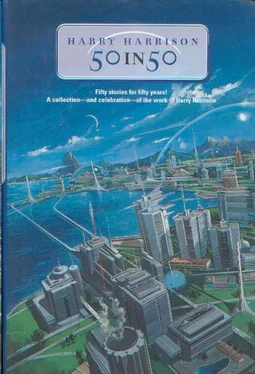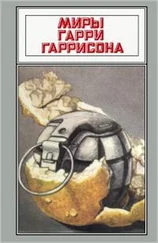Гарри Гаррисон - 50 in 50
Здесь есть возможность читать онлайн «Гарри Гаррисон - 50 in 50» весь текст электронной книги совершенно бесплатно (целиком полную версию без сокращений). В некоторых случаях можно слушать аудио, скачать через торрент в формате fb2 и присутствует краткое содержание. Жанр: Фантастика и фэнтези, на английском языке. Описание произведения, (предисловие) а так же отзывы посетителей доступны на портале библиотеки ЛибКат.
- Название:50 in 50
- Автор:
- Жанр:
- Год:неизвестен
- ISBN:нет данных
- Рейтинг книги:5 / 5. Голосов: 1
-
Избранное:Добавить в избранное
- Отзывы:
-
Ваша оценка:
- 100
- 1
- 2
- 3
- 4
- 5
50 in 50: краткое содержание, описание и аннотация
Предлагаем к чтению аннотацию, описание, краткое содержание или предисловие (зависит от того, что написал сам автор книги «50 in 50»). Если вы не нашли необходимую информацию о книге — напишите в комментариях, мы постараемся отыскать её.
50 in 50 — читать онлайн бесплатно полную книгу (весь текст) целиком
Ниже представлен текст книги, разбитый по страницам. Система сохранения места последней прочитанной страницы, позволяет с удобством читать онлайн бесплатно книгу «50 in 50», без необходимости каждый раз заново искать на чём Вы остановились. Поставьте закладку, и сможете в любой момент перейти на страницу, на которой закончили чтение.
Интервал:
Закладка:
So did Aldo Gabrielli and he knew it; he wished that he had something to do besides watch and wait. Dark-haired, swarthy, with a magnificent nose, he looked typically Italian and was an eleventh-generation American. His position in electronic engineering was a secure as Nissim's in physics — if not better. He was considered a genius whose work with the scantron amplifier had revolutionized matter transmitter mechanics. He was scared.
The C. Huygens fell down through the thickening atmosphere of Saturn. That was the ship's official name, but the men who had assembled her at Saturn One called the vehicle simply "the Ball." Essentially that is just what it was, a solid metal sphere with walls ten meters thick, enclosing the relatively minuscule space in its center. The immense, wedge-shaped sections had been cast in the asteroid belt and sent to the Saturn One satellite station for assembly. There, in high orbit, with the unbelievable beauty of the rings and the great bulk of the planet hanging above them, the Ball had taken shape. Molecular welding had joined the sections into a seamless whole, and, just before the final wedge had been slid into place, the MT screen had been carefully placed inside. When the last piece had been joined to the others the only access to the center of the Ball was through the matter transmitter. Once the welders, with their destroying radiation, were through, the final construction could begin. The specially constructed large MT screen had been built under the floor, on which was soon mounted the supplies, atmosphere equipment, and apparatus that made the Ball livable for men. Then the controls were installed, as well as the external tanks and jets that transformed it into an atomic-engined space vessel. This was the ship that would drop down to the surface of Saturn.
Eighty years previously the C. Huygens could not have been built since the pressure-compacted alloys had not yet been developed. Forty-two years earlier it could not have been assembled because molecular welding had not been invented. Ten years ago the unpierced hull could not have been used since that was when atomic differentiation had first been made practical. No wires or wave guides weakened the solidity of the metal hull of the Ball. Instead, areas of differentiation passed through the alloy, chemically and physically the same as the metal around them, yet capable of carrying separate electric impulses. Taken in its entirety, the Ball was a tribute to the expanding knowledge of mankind. Taking the three men to the bottom of Saturn's twenty-thousand-mile-deep atmosphere, it was a sealed prison cell.
All of them had been conditioned against claustrophobia, yet still they felt it.
"Come in control, how do you read me?" Stan said into his microphone, then switched to receive with a quick movement of his jaw against the switch. There was a few seconds' delay as the recording tape clicked out through the MT screen and the return tape rolled into his receiver.
"One and three," the speaker hissed, a sibilant edge to all the sounds.
"That's the beginning of the sigma effect," Aldo said, his hands still for the first time. He looked deliberately at the pressure gauge. “A hundred thirty-five thousand atmospheres, that's the usual depth where it begins.”
"I want to look at the tape that came through," Nissim said, grinding out his cigarette. He reached for his harness release.
"Don't do that, Doc," Stan said, raising a warning hand. "This has been a smooth drop so far but it's sure to get bumpy soon. You know what the winds in this atmosphere must be like. So far we've been in some kind of jet stream and moving laterally with it. That's not going to last forever. I'll have them send another tape through your repeater."
"It will take only a moment," Nissim said, but his hand hesitated on the release.
"You can break your skull quicker than that," Stan said and, as if to verify his words, the immense bulk of the Ball surged violently sideways, tipping as it did so. The two scientists clung to their couches while the pilot rightened the ship.
"You're an accurate prophet of doom.” Aldo said. "Do you dispense good omens as well?"
"Only on Tuesdays, Doc," Stan answered imperturbably as the pressure gauge died again and he switched to the next transmitter. "Rate of fall steady."
"This is taking an infernally long time," Nissim complained, lighting a cigarette.
"Twenty thousand miles to the bottom, Doc, and we don't want to hit too hard."
"I am well acquainted with the thickness of Saturn's atmosphere," Nissim said angrily. "And could you refrain from calling me Doc? If for no other reason than that you address Doctor Gabrielli in the same way, and a certain confusion results."
''Right you are, Doc." The pilot turned and winked as he heard the physicist's angry gasp. "That was just a joke. We're all in the same boat so we can all be cobbers just like at home. Call me Stan and I'll call you Nissim. And what about you, Doc, going to be Aldo?"
Aldo Gabrielli pretended that he did not hear. The pilot was an infuriating man. "What is that?" he asked as a continuous, faint vibration began to shake the Ball.
"Hard to tell," the pilot answered, throwing switches rapidly, then examining the results on his screens. "Something out there, clouds ttiaybe, that we're moving through. Varying impacts on the hull."
"Crystallization," Nissim said, looking at the pressure gauge. "The top of the atmosphere is two hundred and ten degrees below zero Fahrenheit, but up there the low vapor pressure prevents freezing. The pressure is much higher now. We must be falling through clouds °f methane and ammonia crystals—"
"I've just lost my last radar," Stan said. "Carried away."
"We should have had television pickups; we could see what is out there.” Nissim said.
"See what?" Aldo asked. "Hydrogen clouds with frozen crystals in them? They would have been destroyed like the other instruments. The radio altimeter is the only instrument that's essential."
"And it's working fine," Stan announced happily.
"Still too high for a reading, but it's in the green. Should be; it's an integral part of the hull."
Nissim sipped from the water tube on the side of his couch. Aide's mouth was suddenly dry as he saw this and he drank, too. The endless fall continued.
"How long have I been asleep?" Nissim asked, surprised that he had actually dropped off despite the tension.
"Just a few hours," Stan told him. "You seemed to enjoy it. Snored like a water buffalo."
"My wife always says a camel." He looked at his watch. "You've been awake for over seventy-two hours. Don't you feel it?"
"No. I'll catch up later. I've got pills here, and it's not the first time that I've pulled a long watch."
Nissim settled back on the couch and saw that Aldo was muttering figures to himself while he worked out a problem on his hand calculator. No sensation can be experienced indefinitely, he thought, even fear. We were both bloody frightened up there, but it can't go on forever.
He felt a slight tremble of emotion as he looked at the pressure gauge, but it passed quickly.
"It reads solid," Stan said, "but the height keeps shifting." There were dark smears, like arcs of soot, under his eyes, and he had been on drugs for the last thirty hours.
"It must be liquid ammonia and methane," Nissim said. "Or semi-liquid, changing back and forth from gas to liquid. God knows, anything is possible with those pressures outside. Just under a million atmospheres. Unbelievable."
"I believe it," Aldo told him. "Can we move laterally and perhaps find something solid underneath us?"
"I've been doing that for the last hour. We either have to sink into that soup, or hop up again for another drop. I'm not going to try and balance her on her jets, not with the G's we have waiting for us out there."
Читать дальшеИнтервал:
Закладка:
Похожие книги на «50 in 50»
Представляем Вашему вниманию похожие книги на «50 in 50» списком для выбора. Мы отобрали схожую по названию и смыслу литературу в надежде предоставить читателям больше вариантов отыскать новые, интересные, ещё непрочитанные произведения.
Обсуждение, отзывы о книге «50 in 50» и просто собственные мнения читателей. Оставьте ваши комментарии, напишите, что Вы думаете о произведении, его смысле или главных героях. Укажите что конкретно понравилось, а что нет, и почему Вы так считаете.












